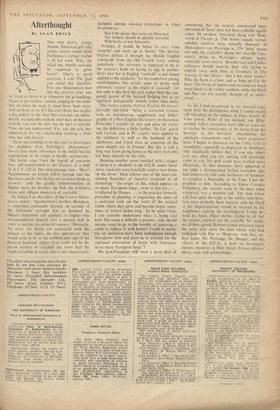Afterthought
By ALAN BRIEN
THE very pretty, young, ' There sva: nothing to do but start to investigate 1 he problem. Eric Partridges Shakespeare's Bawdy lists many references to the belief but his explanation of its origin is hardly satisfactory: The horns arise from the legend of amorous Jove self-transformed to the likeness of a bull' IT & C V i 52-4). The cited passage rons----'Here's Agamemnon, an honest fellow enough and one that loves quails:. but he has not so much brain as ear-w ax : and the goodly transformation of Jupiter there, his brother, the bull, the primitive , statue, and oblique memorial of cuckolds.'
As Sidney Ice, the editor of the Caxton Shake- speare. noted 'Agamemnon's brother, Menelaus, is somewhat confusedly likened, on account of the dishonour wrought him as husband by . He.len7s elopement and adultery, to Jupiter who metamorphosed himself into a horned bull in order to indulge his unlawful amours,' Obviously, the more the horns are associated with the seducer, or the rapist, the less appropriate. they • would seem to be as the emblem and sign of the deceived husband. Jupiter-Jove could not be the Patron divinity of cuckolds any more than the Virgin-ravishing Actaeon, who is also inaccurately
included among classical prototypes in Titus
A tulronicus:
Had I the Power that some say Dian had, Thy temples should be planted presently With horns, as was Actaeon's.
Perhaps, it would be better to start from 'cuckold' and work up to 'horns.' The Shorter
Oxford derives it through the Middle English
'cokevvold' from the Old French 'cucu,' adding tentatively--`the reference is supposed to be to the cuckoo's habit of laying its egg in another bird's nest but in English "cuckold" is not found applied to the adulterer.' To the tenderfoot among word-hunters, this would seem to pretty well eliminate 'cuckoo' as the origin of 'cuckold': for not only is this bird the real, rather than the sup- posed, parent of the bastard fledging but as an egg-layer indisputably female rather than male.
The twelve-volume Oxford English Dictionary (proudly sub-titled—'being a corrected re-issue with an introduction, supplement and biblio- graphy of a New English Dictionary on Historical Principles') justifies its size and price by carry- ing the definition a little farther. 'In Ger. gauch and kuckuk, and in Pr. cogotz, were applied to the adulterer as well as the husband of the adulteress, and Littrd cites an assertion of the same double use in French.' But this is still a long way from giving horns to the poor fool who has been cheated by his wife.
Meaning number seven (marked with a dagger to show it is obsolete) in the O.E.D. under 'horn' states 'cuckolds were fancifully said to wear horns on the brOw:' Then follows one of the least con- vincing flourishes of fanciful erudition in all etymology—`the origin of this, which appears in so many European langs., even in late Gr., . .
is referred by Dunger to the practice formerly prevalent of planting or engrafting the spurs of a castrated cock on the roots ' Of the excised comb, where they grew and became horns, some- times of several inches long.' To be quite frank. I can scarcely understand what is. being said here. The scene is difficult to picture- why should anyone want tO go to the trouble of removing a comb to replace it with horns? Could so eccen- tric an operation have been widespread enough throughout time and place as to account for the continual association of horns with impotence 'in so many European langs.'?
We post-Freudians will need a good deal of convincing that the 'natural, uncensored inter- pretation of 'horn' does not have a phallic signifi- cance. In modern American slang (see Went- worth & Flexner p. 270) 'horny' equals 'carnal-
minded, amative, lusty, sexually obsessed.' In Shakespeare (see Partridge p. 129) 'horn' means not only the cuckold's shame but also the C'asa- nova's pride in Partridge's phrase 'penis, especially penis erectus.' Bowdlerisers and Littler- followers should exercise their wits trying to explain away such lines as Grumio's in The Taming of the Shretv—.'Am I but three inches? Why thy horn is a foot, and so long am I at the least.' The horns of Jupiter and Actaeon are much more likely to be virility symbols while the Devil and Pan are not usually thought of as under- sexed.
So far I had progressed in my internal argu- ment with the dictionaries when I found Myself still brooding on the subject, in Fleet Street's. El Vino tavern. None of my learned, and filthy- minded, fellow-journalists were able to assist Me in tracing the transference of the horns from the betrayer to the betrayed. Abandoning the scholastic conundrum until a more propitious' hour, I began to discourse on the Celtic faith in serendipity, especially as displayed by Dubliners who steadfastly believe that, if you stay where you are, what you are seeking will inevitably come to you. No spell could have worked more effectively. At that moment, there appeared at my table 'a distinguished Italian journalist who had temporarily laid aside his history of Satanism to complete a biography of the Pope. I put the problem to him. According to Signor Corrado Pallenberg, the custom arose in the days when witchcraft ■%:zts a popular cult. The man whose it ire had spent the night at the sabbat (and there- fore most probably been intimate with the Des it or his impersonation) would be mocked by his neighbours making the two-lingered V-sign be- hind his head. These horns, visible to all but the wearer, marked out the cuckold. No doubt, we all then agreed, Roman crowds practised much the same joke upon the man whose it lie had trafficked with Pan or Dionysus. And that, my dear Janet, Mr. Partridge, Dr. Dunger, and the editors of the 0.E.D.,, is how we investigate literary mysteries in Fleet Street. Future editions please copy and acknowledge.






























 Previous page
Previous page